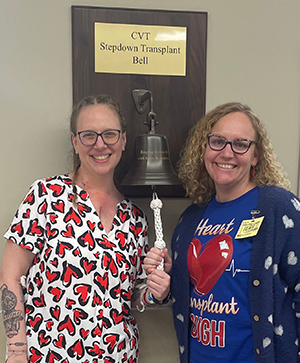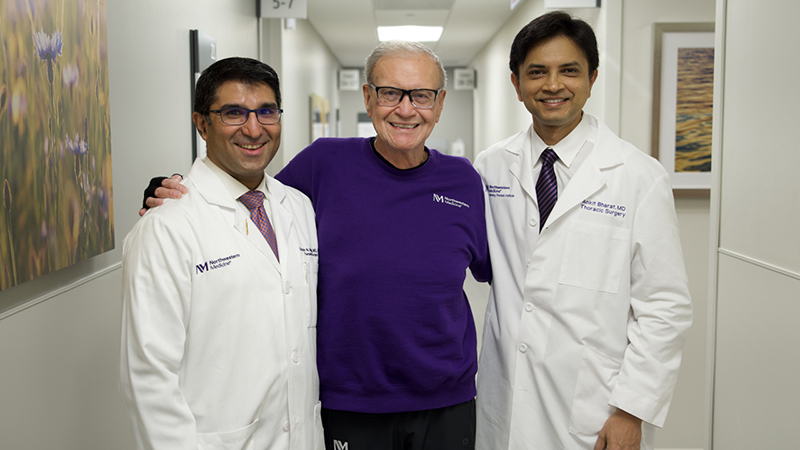Sisters Receive Heart Transplant 7 Years Apart at Northwestern Medicine
United by a Genetic Heart Condition and a Second Chance at Life
Published November 2024
In fall 2012 while living in Nashville, Tennessee, Abbey Cannon started experiencing shortness of breath, heart palpitations, chest tightness, arm numbness and tingling. She went to the emergency department, suspecting that she may have had a heart attack. However, Abbey was diagnosed with non-obstructive hypertrophic cardiomyopathy (HCM), a genetic condition where the heart muscle thickens and stiffens but doesn’t block blood flow.
After being home for two weeks, Abbey says she didn’t feel herself getting better. She lacked energy to do normal day-to-day activities. Abbey attended a follow-up appointment with her mom and husband and learned her condition was more severe than she realized.
“The cardiologist told me, ‘I have never seen a case as bad as yours. You're likely going to need a heart transplant,’” explains Abbey. “My doctor also told me it could be 10 to 15 years before I got a transplant. I just remember all three of us started crying.”
To work here and to have care here has been everything.— Meredith Everhart
Abbey faced another hurdle, too. She did not meet the criteria for a heart transplant at the hospital where she was being treated. In the meantime, Abbey was given beta blockers, a medication that makes the heart beat more slowly with less force, but she felt more tired.
“I ended up with blood pressures that were like 95/65. I was like an elderly person walking around in a 30-year-old’s body,” says Abbey. “I would wake up, take my kids to school, go home and nap for a few hours. Wake up in time to pick them up. Work through homework and dinner and go to bed.”
Abbey’s Journey to a Heart Transplant
Abbey decided to get a second opinion on her health. She connected with the Hypertrophic Cardiomyopathy Association and was told she needed to go to a center of excellence for proper care. One of those centers was Northwestern Medicine Bluhm Cardiovascular Institute.
In June of 2016, Abbey, a Chicago native, her husband and their two kids moved back to her childhood home to live with her parents so she could be seen by the HCM team at Northwestern Memorial Hospital.
Abbey found Lubna Choudhury, MD, a cardiologist at Bluhm Cardiovascular Institute who specializes in HCM. Dr. Choudhury referred Abbey to the Northwestern Medicine Center for Heart Failure because her condition was getting worse.
After several tests, the team determined Abbey needed a heart transplant immediately and acted quickly to begin the transplant process. In January 2017, she moved into Northwestern Memorial Hospital inpatient care so her care team could keep close watch over her. She was told at that point that she only had approximately three to nine months to live if she did not get the transplant.
“I was like move me in, I want a heart. I want to live,” says Abbey.
Abbey got a heart transplant in February 2017.

Meredith’s Journey to a Heart Transplant
After Abbey received her heart transplant, her sister Meredith Everhart, LCSW, a social worker at Northwestern Medicine, was diagnosed with HCM in March 2017.
“When I got a job at Northwestern Medicine as a social worker, I was so excited because my older sister Abbey got her heart transplant here,” says Meredith. “Little did I know that seven years later, I’d be getting one here, too.”
Meredith remembered feeling symptoms like fatigue and chest pains as early as 19. She struggled to complete a full workout and remembers feeling so tired, she almost fell asleep while driving.
Meredith says she was in denial about her condition because she was focused on supporting Abbey during her journey. She was in Nashville, Tennessee, with Abbey when she was diagnosed with HCM and also moved back to Chicago to live with her family when her sister did.
“I wanted to be ‘normal,’” says Meredith. “I saw my sister suffering, and I didn’t want to suffer. I was the champion. I wanted to help with the kids. I wanted to be a social worker. I wanted to continue to go out with my friends and do all these things.”
After her heart transplant, Abbey says she was able to do her usual activities again, like exercising and riding a bike without feeling extremely tired. She supported Meredith just like Meredith had supported her.
Meredith turned to the same HCM team at Northwestern Memorial Hospital for specialized care, just like her sister.
For several years, Meredith tried different medications to treat the symptoms and entered a few clinical trials, but her condition kept getting worse.
In May 2022, Meredith got COVID-19, and it sent her into heart failure. Dr. Choudhury also referred her to the Center for Heart Failure.
In January 2023, Meredith was evaluated for a heart transplant with the Northwestern Medicine Heart Failure team. In May 2023, Meredith was approved and listed for a transplant.
Meredith continued to work from home while waiting on the transplant list. She says she grew weary after months of waiting but tried her best to be patient.
“As soon as I decided to let it go and not stress, I got the call three days later that changed my life,” says Meredith. “The doctors called and asked me, ‘Can you get to Northwestern Memorial Hospital in three hours? We have a heart for you.’”
“I jumped up and down. I had no fear or anxiety because I saw how a heart transplant changed my sister’s life for the better,” says Meredith.
In January 2024, Meredith went in for her transplant with Cardiac Surgeon Benjamin S. Bryner, MD. Meredith’s journey after surgery was tough at first. She was placed on life support after surgery due to primary graft dysfunction. She did intensive physical and occupational therapy three days a week for three hours at a time. She also started cardiac rehabilitation in March 2024.
Finally, eight weeks after her transplant, Meredith went on her first bike ride. It was the first time in three years she was able to ride a bike without getting extremely tired. She also went indoor skydiving.
Meredith says it’s been a joy to receive the same care she watches her colleagues at Northwestern Medicine provide to patients every day.
“To work here and to have care here has been everything,” says Meredith. “It’s so inspirational for me to be able to say I work at a place that not only saved my sister's life but saved my own life,” says Meredith.
Understanding HCM
Esther E. Vorovich, MD, is an advanced heart failure and transplant cardiologist at Northwestern Medicine. She is Meredith and Abbey’s cardiologist and tracks how HCM appears in families to better understand it.
“Because HCM is genetic, it often runs in families,” says Dr. Vorovich. “One of the complicating factors is two people or even three or four people in a family could have the same genetic abnormality and present very differently. Where some have zero symptoms, others have abnormal heart rhythms. The worst it can be is needing a heart transplant.”
Approximately 5% of people who have HCM receive a transplant. Dr. Vorovich says seeing this in siblings is rare.
Dr. Vorovich says the emotional support for patients who have HCM is critical for recovery. Many patients say the hardest thing about recovery is the psychological impact of what they have gone through, not the physical recovery they face.
“I think what sticks out to me the most about Meredith and Abbey is the amazing way in which both of them handled such adversity with grace and kindness, and how great of a support they were for each other,” says Dr. Vorovich. “It was really heartwarming to see.”





